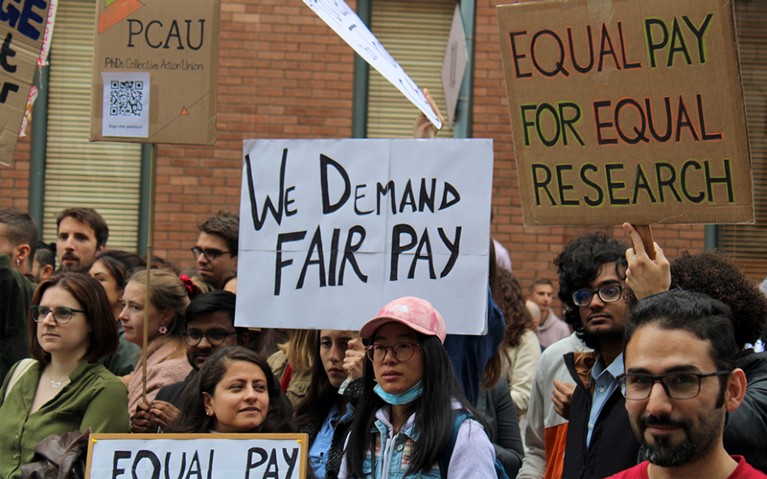[ad_1]

Members of the PhDs’ Collective Action Union protest in Dublin in September over stipend rates they deem to be too low.Credit: Corinne Mahon for The University Times
PhD students and a university association in Ireland are campaigning for a substantial increase in PhD stipends, amid concerns that the nation’s cost of living far exceeds students’ annual funding.
Students and the Irish University Association (IUA), which represents research-intensive universities, want the stipend to increase from its current annual average of €18,500 (US$18,200). The students have called for a stipend of €28,000, whereas the IUA is suggesting €24,000.
Campaigners are also calling for improved rights, including paid sick leave and parental leave. Students say that they perform a great deal of unpaid labour in the laboratory, such as delivering tutorials and editing lab reports, and they want such work to be recognized through better pay and conditions.
The current PhD stipend is more than €8,000 below the annual living wage, the IUA and students say. They contend that a stipend boost of €500, announced in September in the national budget, is insufficient to bridge the gap. “I was shocked to see how bad [the situation] is,” says Julie Bekkevold, who has just begun a PhD in electron microscopy at Trinity College Dublin. “The cost of living is horrendous.” Bekkevold, who arrived from Norway in August, joined a protest last month organized by the PhDs’ Collective Action Union (PCAU), seeking better financial support for PhD students.
Collection: Career resources for PhD students
The campaign comes amid news of a joint initiative, involving industry and the Irish government, to attract up to 400 PhD students from Ireland and abroad to do research in the nation on grand challenges such as climate change and water poverty. Students recruited under this scheme are expected to receive an annual stipend of €28,000. However, a spokesperson at Ireland’s Department of Further and Higher Education, Research, Innovation and Science says that the stipend amount has not been set. The spokesperson did not respond to requests from Nature for clarification.
PhD students are undervalued, says Jeffrey Sardina, a PhD student researching machine learning at Trinity College Dublin, and acting president of the PCAU. The advocacy group is pushing for more funding and better rights. “We have no sick leave, no maternity cover,” he says. “Students can barely afford to pay their rent.”
The cost of living has risen by 9.1% over the past year in Ireland, the largest annual increase since 1984, according to Ireland’s Central Statistics Office in Cork.
Lisa Keating, director of research and innovation at the IUA, is concerned that low stipends, coupled with the rising cost of living, will prevent less-affluent students from pursuing doctoral degrees in Ireland. She says that the stipend boost announced in September is insufficient. “In the absence of appropriate financial supports, there is a greater risk of imbalance in terms of equality, diversity and inclusion,” Keating said in a statement, adding that some students are leaving midway through their studies.
Some 250 PhD students attended last month’s PCAU protest in front of Ireland’s legislative building in Dublin. The group was protesting to raise lawmakers’ awareness of the financial difficulties facing the country’s PhD researchers. The protests follow similar campaigns in the United Kingdom that succeeded in winning higher PhD stipends.
In August and September, the PCAU wrote to Simon Harris, Ireland’s minister for further and higher education, research, innovation and science, seeking a higher stipend and a meeting to discuss their needs and concerns. As of 19 October, Harris had not yet agreed to meet with the group. But in a written response to Nature, a spokesperson said that Harris’s department would be reviewing provisions for PhD training, including stipends.
Bekkevold chose to pursue her PhD in Dublin after falling in love with the city on a previous trip. Also, her supervisor is a “rock star” in her field, she says. “It’s the perfect PhD for me. Since I saw my first electron microscope, I knew this is what I wanted to do with my life.”
But now Bekkevold is concerned that she might not be able to afford to complete her PhD. She still welcomes the proposed stipend increase in the national budget because, she says, some gain is better than none. “When you live below the minimum wage, you are grateful for every extra penny,” she says.
[ad_2]
Source link


